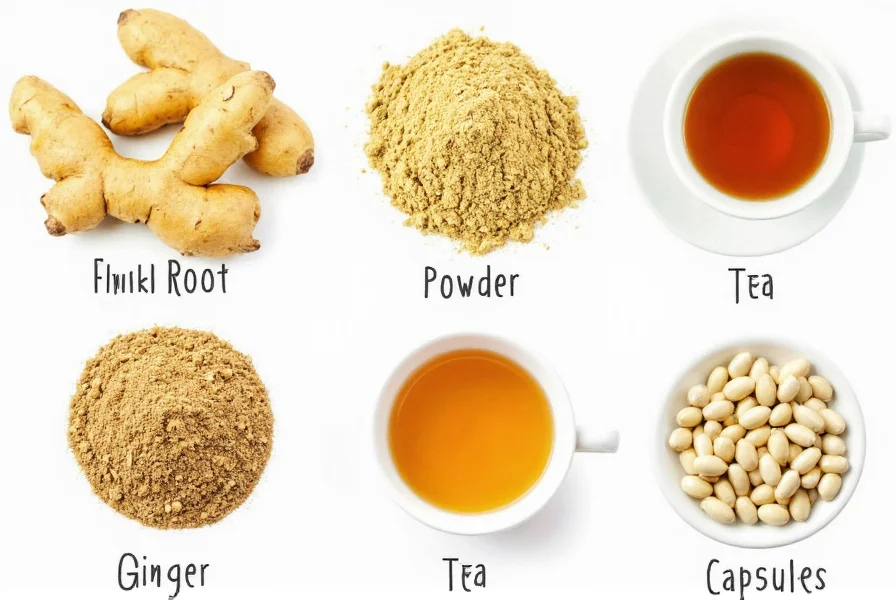Ginger (Zingiber officinale) has been used for centuries in traditional medicine systems across Asia and the Middle East. Modern scientific research continues to validate many of these traditional uses while uncovering new potential applications for this versatile root. Unlike many herbal remedies with limited evidence, ginger stands out for having substantial clinical research supporting several of its health benefits.
Scientifically-Validated Health Benefits of Ginger
Nausea and Digestive Relief
One of ginger's most well-documented benefits is its effectiveness against various forms of nausea. Multiple clinical trials demonstrate ginger's efficacy for:
- Pregnancy-related morning sickness (with 1g daily showing significant improvement)
- Post-operative nausea
- Chemotherapy-induced nausea
- Motion sickness
A 2020 meta-analysis published in Nutrition Reviews concluded that ginger supplementation significantly reduced nausea severity compared to placebo across multiple studies. The mechanism appears to involve ginger's ability to accelerate gastric emptying and modulate serotonin receptors in the digestive tract.
Anti-Inflammatory and Pain-Relieving Properties
Ginger contains gingerols and shogaols, compounds with potent anti-inflammatory effects. Research shows these compounds inhibit inflammatory pathways similar to non-steroidal anti-inflammatory drugs (NSAIDs), but with fewer side effects.
Studies on osteoarthritis patients found that 2g of ginger extract daily reduced pain scores by 30% after 6 weeks. Another study tracking athletes showed that daily consumption of 2g raw or heated ginger reduced muscle pain from exercise by approximately 25%.
| Health Benefit | Scientific Support Level | Recommended Daily Amount | Time to Notice Effects |
|---|---|---|---|
| Nausea relief | Strong (multiple RCTs) | 1-1.5g | Within 30-60 minutes |
| Muscle pain reduction | Moderate-Strong | 2g | 2-3 weeks of regular use |
| Osteoarthritis symptom relief | Moderate | 2g extract | 4-6 weeks |
| Blood sugar regulation | Preliminary | 2-3g | 8-12 weeks |
Cardiovascular and Metabolic Benefits
Emerging research suggests ginger may support heart health through multiple mechanisms. A 2021 study in Complementary Therapies in Medicine found that ginger supplementation (3g daily) significantly reduced LDL cholesterol and triglycerides in participants with type 2 diabetes.
Additional research indicates ginger may help regulate blood sugar levels by improving insulin sensitivity. While promising, these cardiovascular benefits require more extensive human trials to establish definitive recommendations.
Different Forms of Ginger and Their Effectiveness
Ginger's effectiveness varies depending on how it's prepared and consumed:
- Fresh ginger root: Contains highest levels of gingerol; ideal for digestive benefits
- Dried ginger powder: More concentrated; often used in clinical studies
- Ginger extract: Standardized for specific compounds; provides consistent dosing
- Cooked/processed ginger: Converts gingerol to shogaol, which has different bioavailability
Research suggests that heating ginger actually increases the concentration of shogaols, compounds with potentially stronger anti-inflammatory properties than gingerols. This explains why some traditional preparations involve cooking ginger to enhance specific benefits.

Safety Considerations and Potential Side Effects
Ginger is generally recognized as safe by the FDA when consumed in typical food amounts. However, higher medicinal doses may cause:
- Mild heartburn or stomach discomfort
- Increased risk of bleeding when combined with anticoagulants
- Potential interactions with diabetes medications
- Lowered blood pressure (caution for those with hypotension)
The recommended maximum daily intake for adults is 4 grams, though most studies showing benefits use 1-3 grams daily. Pregnant women should consult their healthcare provider before consuming ginger medicinally, though culinary amounts are generally considered safe.
Practical Ways to Incorporate Ginger Into Your Daily Routine
Maximizing ginger's benefits requires consistent consumption. Here are evidence-based methods:
- Ginger tea: Steep 1-2 tablespoons of freshly grated ginger in hot water for 10 minutes
- Smoothie booster: Add 1-inch piece of fresh ginger to fruit smoothies
- Culinary applications: Use in stir-fries, salad dressings, or marinades
- Ginger shots: 1-2 ounces of fresh ginger juice (diluted with water or citrus)
For nausea relief, consuming ginger 30 minutes before potential triggers (like travel) provides optimal results. For chronic conditions like osteoarthritis, consistent daily consumption yields the best outcomes.

Limitations of Current Research
While ginger shows promise for several health conditions, it's important to understand the limitations of current research:
- Many studies use small sample sizes
- Optimal dosing isn't standardized across conditions
- Long-term safety data is limited
- Individual responses vary significantly
Ginger should be viewed as a complementary approach rather than a replacement for conventional medical treatments. Those with serious health conditions should always consult healthcare professionals before using ginger therapeutically.
Frequently Asked Questions
How much ginger should I consume daily for health benefits?
For general health benefits, 1-3 grams of fresh ginger daily is recommended. Most clinical studies showing benefits use 1.5-2 grams per day. This equals approximately 1 tablespoon of freshly grated ginger. Higher amounts up to 4 grams daily are generally safe for most adults but should be discussed with a healthcare provider.
Can ginger help with morning sickness during pregnancy?
Yes, multiple studies show ginger can reduce pregnancy-related nausea. A typical effective dose is 1 gram daily, often divided into multiple smaller doses. While generally considered safe during pregnancy, women should consult their healthcare provider before using ginger medicinally, especially if they have a history of miscarriage or are at risk for bleeding complications.
What are the potential side effects of consuming too much ginger?
Consuming more than 4 grams of ginger daily may cause mild side effects including heartburn, diarrhea, and mouth irritation. Ginger can increase bleeding risk, so those taking blood thinners should be cautious. It may also lower blood sugar, requiring monitoring for people with diabetes. Individuals with gallstones should consult a doctor before consuming medicinal amounts as ginger may increase bile production.
Is fresh ginger more effective than powdered ginger?
Both forms offer benefits but with some differences. Fresh ginger contains higher levels of gingerol, beneficial for digestive issues. Powdered or dried ginger has converted some gingerol to shogaol through the drying process, which may provide stronger anti-inflammatory effects. For most health benefits, either form is effective when consumed in appropriate amounts, though specific conditions may respond better to one form over the other.
How long does it take to experience ginger's health benefits?
The timeframe varies by benefit. Nausea relief can occur within 30-60 minutes of consumption. For muscle pain reduction, consistent daily use for 1-2 weeks shows noticeable effects. Chronic conditions like osteoarthritis typically require 4-6 weeks of regular consumption to observe significant improvement. Blood sugar regulation benefits may take 8-12 weeks of consistent use to become apparent.











 浙公网安备
33010002000092号
浙公网安备
33010002000092号 浙B2-20120091-4
浙B2-20120091-4